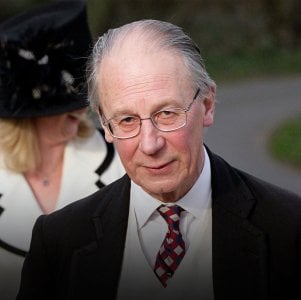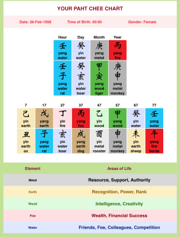Royal Family mourns trusted advisor and respected figure’s death at 82
- Replies 9
In a sombre announcement, a member of the Royal Family has passed away, leaving behind a significant legacy and a lifetime of achievements.
The news has elicited heartfelt reactions from various quarters, underscoring the distinguished individual's impact and contributions.
As the nation mourns, reflections on this respected personality's remarkable journey and enduring influence continue to emerge.
The British Royal Family and the nation are mourning the loss of a distinguished figure, Lord Robert Fellowes, who passed away on Monday, July 29, at the age of 82.
As the uncle to Princes William and Harry, his death has brought a wave of sorrow to the monarchy and beyond.
Earl Spencer, the brother of the late Princess Diana, led heartfelt tributes to the man who was not only a relative but a trusted advisor to the Queen during some of the most turbulent times in recent royal history.

Lord Fellowes, born into a family closely intertwined with the royals, served as the Queen's private secretary from 1990 to 1999.
His tenure saw him guide the monarch through the tumultuous period known as the ‘annus horribilis’ in 1992, marked by the divorces of three of her children and the devastating fire at Windsor Castle.
His counsel was invaluable again in 1997, following the tragic death of Princess Diana, where he helped navigate the royal response to a grieving nation.
Lord Fellowes also had to refute strange allegations made by Harrods owner Mohamed Al Fayed, who claimed that he was part of a plot to kill his son Dodi and Diana.
His marriage to Lady Jane Spencer, Princess Diana’s elder sister,, in 1978 further cemented his ties to the royal family, with their children Alexander, Eleanor, and Laura (Princess Charlotte's godmother) continuing the familial bond.
Lord Fellowes's life was one of service, not only to the crown but also to the country, as he held various positions that reflected his commitment to public duty.
In his later years, Lord Fellowes remained an extra equerry to Queen Elizabeth II until her death in September 2022, a testament to his enduring loyalty and the respect he garnered within the royal household.
Actor Andrew Havill's portrayal of him in the popular Netflix series The Crown introduced him to a global audience, highlighting his significant role during a pivotal era for the monarchy.
The cause of his death has not been disclosed, and funeral plans are yet to be revealed. However, the impact of his passing is evident in the tributes that have poured in.
‘My absolutely exceptional brother-in-law, Robert, is no longer with us,’ Earl Spencer announced on social media.
‘A total gentleman—in all the best meanings of that word—he was a man of humour, wisdom and utter integrity. I'm deeply proud to have been his brother-in-law.’
Lord Fellowes's life story is one of dedication and discreet influence at the heart of the British establishment.
Lord Fellowes was born in Sandringham in 1941. His father, Sir William ‘Billy’ Fellowes, served as the estate manager from 1936 to 1964 and was known for going shooting with King George VI.
His mother, Jane Fellowes, was the daughter of Brigadier General Algernon Ferguson, who served as the high sheriff of Northamptonshire and was the great-grandfather of Sarah, Duchess of York.
An obituary in The Times noted that one of the first people to meet him after his birth was the then-Princess Elizabeth. She later remarked, ‘Robert is the only one of my private secretaries I have held in my arms.’
He attended Eton College, earning the nickname ‘walking Wisden’ due to his extensive cricket knowledge, but he never attended university. Instead, he was commissioned into the Scots Guards and served in the Army from 1960 to 1963.
Afterwards, he began working for the discount brokers Allen, Harvey and Ross in the City.
In 1977, he became the Queen's assistant private secretary and married Lady Jane Spencer in 1978, with Princess Diana as a bridesmaid at their wedding.
He progressed at Buckingham Palace, becoming deputy private secretary in 1986 and succeeding Sir William Heseltine as private secretary in 1990.
Shortly after assuming the role, he supported the Queen during the challenging 'annus horribilis' of 1992, which included family scandals involving her children Charles, Anne, and Andrew.
Additionally, a fire on November 20 that year caused significant damage to Windsor Castle, destroying 115 rooms, including nine staterooms.
Reflecting on that challenging year during a speech on November 24, 1992, to over 500 VIP guests at a Corporation of London Guildhall luncheon marking her 40th year on the throne, Elizabeth II remarked, ‘1992 is not a year on which I shall look back with undiluted pleasure.’
‘In the words of one of my more sympathetic correspondents, it has turned out to be an “Annus Horribilis”. I suspect that I am not alone in thinking it so.
The Queen's use of the Latin phrase ‘annus horribilis’, meaning ‘horrible year’, was a play on the more commonly used ‘annus mirabilis’, meaning ‘year of wonders’.
When Princess Diana died in 1997, the Queen was at Balmoral and faced criticism for not returning to London sooner.
Lord Fellowes believed this criticism was unfair but eventually decided a change was necessary, hastening her return to London.
He also wrote the first draft of her widely praised speech to the nation, where she referred to herself as ‘your Queen, and as a grandmother’.
In 1999, he passed his role to his deputy, Sir Robin Janvrin, and returned to the City to become chairman of Barclays Private Bank.
After leaving the Royal Family, Lord Fellowes became a life peer, served as a privy counsellor, and worked as chairman of the Prison Reform Trust.
‘My life has been spent in quite a gilded cage. Eton, Guards, the royal household and subsequently Barclays,’ he stated in 2008.
‘To be introduced to a prison was a culture shock and very salutary.’
Speaking about his sister-in-law Diana's work, Lord Fellowes said, ‘She was very good at it—an extraordinary communicator with a great feeling for the underdog.’
‘It never became patronising. She chose the areas where she thought she could make a difference, and on the whole, she did that.’
In a 2003 interview, he explained his decision to sit on the crossbenches in the Lords.
‘In my previous life, I had to be apolitical, and it became a habit. It's difficult for anyone who has been working in the private office of the sovereign to take a party whip,’ Lord Fellowes shared.
‘And it suits my temperament to be a crossbencher - though my friends probably regard me as a frightful pinko.’
 To our readers at the Seniors Discount Club, we extend our condolences to the Royal Family and invite you to share your memories or thoughts on the impact of such figures in public service.
To our readers at the Seniors Discount Club, we extend our condolences to the Royal Family and invite you to share your memories or thoughts on the impact of such figures in public service.
How do you believe Lord Fellowes's contributions have shaped the monarchy, and what lessons can we take from his life of service? Share your reflections in the comments below.
The news has elicited heartfelt reactions from various quarters, underscoring the distinguished individual's impact and contributions.
As the nation mourns, reflections on this respected personality's remarkable journey and enduring influence continue to emerge.
The British Royal Family and the nation are mourning the loss of a distinguished figure, Lord Robert Fellowes, who passed away on Monday, July 29, at the age of 82.
As the uncle to Princes William and Harry, his death has brought a wave of sorrow to the monarchy and beyond.
Earl Spencer, the brother of the late Princess Diana, led heartfelt tributes to the man who was not only a relative but a trusted advisor to the Queen during some of the most turbulent times in recent royal history.

Lord Robert Fellowes, uncle of Princes Harry and William and former private secretary to Queen Elizabeth II, has died at 82. Credit: Facebook / Us Weekly
Lord Fellowes, born into a family closely intertwined with the royals, served as the Queen's private secretary from 1990 to 1999.
His tenure saw him guide the monarch through the tumultuous period known as the ‘annus horribilis’ in 1992, marked by the divorces of three of her children and the devastating fire at Windsor Castle.
His counsel was invaluable again in 1997, following the tragic death of Princess Diana, where he helped navigate the royal response to a grieving nation.
Lord Fellowes also had to refute strange allegations made by Harrods owner Mohamed Al Fayed, who claimed that he was part of a plot to kill his son Dodi and Diana.
His marriage to Lady Jane Spencer, Princess Diana’s elder sister,, in 1978 further cemented his ties to the royal family, with their children Alexander, Eleanor, and Laura (Princess Charlotte's godmother) continuing the familial bond.
Lord Fellowes's life was one of service, not only to the crown but also to the country, as he held various positions that reflected his commitment to public duty.
In his later years, Lord Fellowes remained an extra equerry to Queen Elizabeth II until her death in September 2022, a testament to his enduring loyalty and the respect he garnered within the royal household.
Actor Andrew Havill's portrayal of him in the popular Netflix series The Crown introduced him to a global audience, highlighting his significant role during a pivotal era for the monarchy.
The cause of his death has not been disclosed, and funeral plans are yet to be revealed. However, the impact of his passing is evident in the tributes that have poured in.
‘My absolutely exceptional brother-in-law, Robert, is no longer with us,’ Earl Spencer announced on social media.
‘A total gentleman—in all the best meanings of that word—he was a man of humour, wisdom and utter integrity. I'm deeply proud to have been his brother-in-law.’
Lord Fellowes's life story is one of dedication and discreet influence at the heart of the British establishment.
Lord Fellowes was born in Sandringham in 1941. His father, Sir William ‘Billy’ Fellowes, served as the estate manager from 1936 to 1964 and was known for going shooting with King George VI.
His mother, Jane Fellowes, was the daughter of Brigadier General Algernon Ferguson, who served as the high sheriff of Northamptonshire and was the great-grandfather of Sarah, Duchess of York.
An obituary in The Times noted that one of the first people to meet him after his birth was the then-Princess Elizabeth. She later remarked, ‘Robert is the only one of my private secretaries I have held in my arms.’
He attended Eton College, earning the nickname ‘walking Wisden’ due to his extensive cricket knowledge, but he never attended university. Instead, he was commissioned into the Scots Guards and served in the Army from 1960 to 1963.
Afterwards, he began working for the discount brokers Allen, Harvey and Ross in the City.
In 1977, he became the Queen's assistant private secretary and married Lady Jane Spencer in 1978, with Princess Diana as a bridesmaid at their wedding.
He progressed at Buckingham Palace, becoming deputy private secretary in 1986 and succeeding Sir William Heseltine as private secretary in 1990.
Shortly after assuming the role, he supported the Queen during the challenging 'annus horribilis' of 1992, which included family scandals involving her children Charles, Anne, and Andrew.
Additionally, a fire on November 20 that year caused significant damage to Windsor Castle, destroying 115 rooms, including nine staterooms.
Reflecting on that challenging year during a speech on November 24, 1992, to over 500 VIP guests at a Corporation of London Guildhall luncheon marking her 40th year on the throne, Elizabeth II remarked, ‘1992 is not a year on which I shall look back with undiluted pleasure.’
‘In the words of one of my more sympathetic correspondents, it has turned out to be an “Annus Horribilis”. I suspect that I am not alone in thinking it so.
The Queen's use of the Latin phrase ‘annus horribilis’, meaning ‘horrible year’, was a play on the more commonly used ‘annus mirabilis’, meaning ‘year of wonders’.
When Princess Diana died in 1997, the Queen was at Balmoral and faced criticism for not returning to London sooner.
Lord Fellowes believed this criticism was unfair but eventually decided a change was necessary, hastening her return to London.
He also wrote the first draft of her widely praised speech to the nation, where she referred to herself as ‘your Queen, and as a grandmother’.
In 1999, he passed his role to his deputy, Sir Robin Janvrin, and returned to the City to become chairman of Barclays Private Bank.
After leaving the Royal Family, Lord Fellowes became a life peer, served as a privy counsellor, and worked as chairman of the Prison Reform Trust.
‘My life has been spent in quite a gilded cage. Eton, Guards, the royal household and subsequently Barclays,’ he stated in 2008.
‘To be introduced to a prison was a culture shock and very salutary.’
Speaking about his sister-in-law Diana's work, Lord Fellowes said, ‘She was very good at it—an extraordinary communicator with a great feeling for the underdog.’
‘It never became patronising. She chose the areas where she thought she could make a difference, and on the whole, she did that.’
In a 2003 interview, he explained his decision to sit on the crossbenches in the Lords.
‘In my previous life, I had to be apolitical, and it became a habit. It's difficult for anyone who has been working in the private office of the sovereign to take a party whip,’ Lord Fellowes shared.
‘And it suits my temperament to be a crossbencher - though my friends probably regard me as a frightful pinko.’
Key Takeaways
- Lord Robert Fellowes, the uncle of Princes Harry and William and former private secretary to Queen Elizabeth II, has passed away at the age of 82.
- He provided guidance and support to the monarch through tumultuous periods, including the ‘annus horribilis’ in 1992 and the death of his sister-in-law, Princess Diana, in 1997.
- Lord Fellowes was married to Lady Jane Spencer, Princess Diana's elder sister, and they had three children together, and he remained an extra equerry to Her Majesty until her death.
- Tributes, led by Earl Spencer, have been paid to Lord Fellowes, highlighting his integrity, humour, wisdom, and his impact as a statesman and family member.
How do you believe Lord Fellowes's contributions have shaped the monarchy, and what lessons can we take from his life of service? Share your reflections in the comments below.







